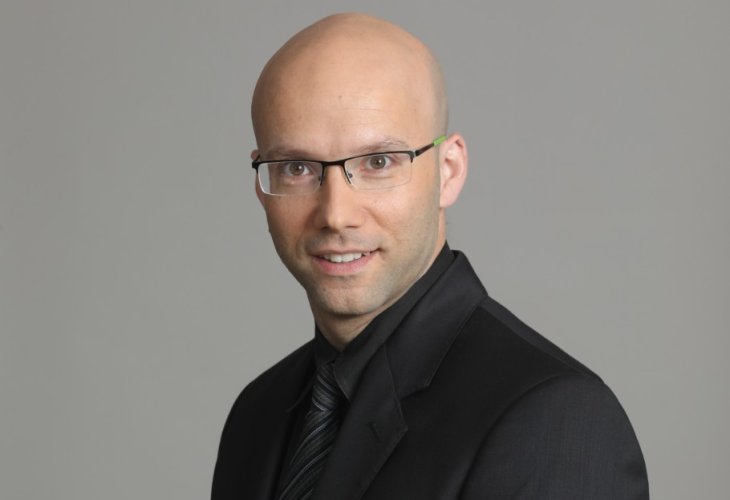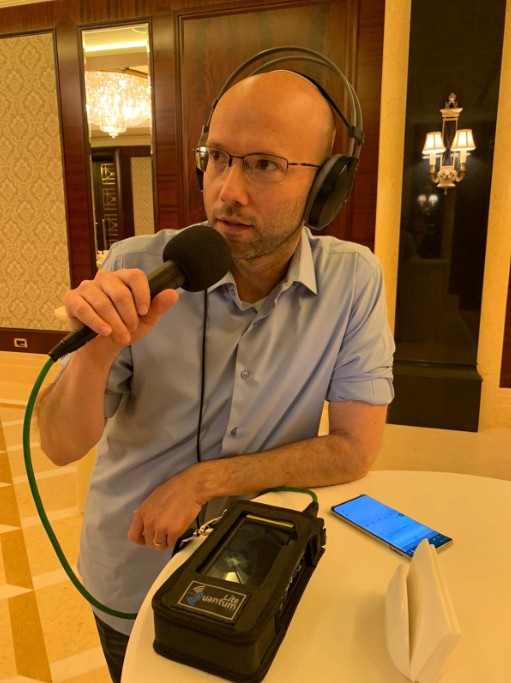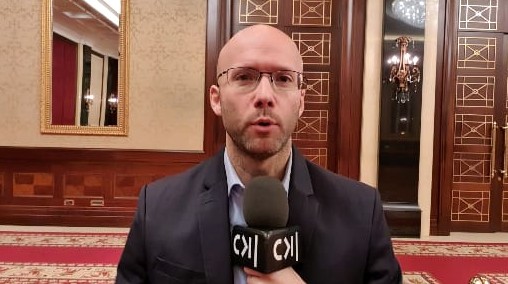Journalist Zev Kam: "I Missed Great Job Offers Because I Refused to Work on Shabbat"
From discarded stories to a surprising journey back to faith, Zev Kam, a Knesset correspondent, reveals his choices over three elections, his daughter's pivotal question, and why he avoids politicians' weddings.

"It's amazing how one question from a little girl can resolve years of dilemma," smiles Zev Kam, 40, married and a father of two living in Jerusalem, and currently a Knesset correspondent at 'Kan Radio B'. We sit in a well-known cafe in Katamon as he shares his internal journey back to Judaism.
"For many years, I was unsure about whether to start wearing a kippah again," Kam confesses. "I was raised in a religious home, but at a certain stage, I stopped wearing it. When I began reconnecting, I wanted to wear the kippah for the right reasons, not to gain anything from it. I wanted to wear it 'for its own sake,' because I sincerely wanted to."
"During this period, I was already leading a religious lifestyle and wore a kippah at home, but not outside. I knew that if I began wearing it, it would cause a stir, raise questions, and I wasn't ready for that. Then, about six months ago, my daughter asked why I wasn't wearing my kippah, and I couldn't explain the complexity to her. I understood her confusion completely. Seeing her question as a sign, I decided to put the kippah back on. I posted about it on Facebook to preempt questions from my Knesset peers and other places, and thankfully, it was well-received."

No Politicians' Weddings
In these turbulent political times when Knesset correspondents exhaust themselves for a third successive election campaign ("It's really tough this prolonged coverage," he admits), it is nearly impossible to catch Kam for a mere five minutes on the phone. Yet, it seems even Knesset correspondents need rest, and thus, we managed to schedule this interview. "Truthfully, I accidentally stumbled into media," he recounts. "As a kid or teenager, I didn’t think about this field. I’m actually a trained lawyer, but during my internship, I realized law wasn't my calling. I completed my bar exams, but it was evident I was seeking something else."
"I drifted between a few roles until, at 28, I began a media and journalism certificate at Bar Ilan while writing opinion columns. Shortly after, I landed a job at a local newspaper in Ramat Gan, and a year later, I joined Avri Gilad's morning show. Then, I realized that political reporting fascinated me the most."
"Happily, in 2010, a right-leaning radio station, Gali Israel, emerged, and I got my first political correspondent job there. I later worked for Maariv, Makor Rishon, and currently the Corporation, continuing in the Knesset for a decade now. Gali Israel holds a special place in my heart. The challenges were immense - transmission issues, limited staff, and barely anyone knowing the station existed. I was both the reporter and the station's promoter, often educating people on its existence for interviews."
How did your religious upbringing influence your journalism career?
"There are general principles I strictly follow, like not mingling too much with MKs since I cover them, which is why I avoid attending politicians' weddings. It's crucial I remain unbiased in my reporting."
"Additionally, regarding matters like slander, my religious education significantly influences me. Often, I deeply contemplate what I should or shouldn't publish. I only release facts I confirm with certainty and justify their publication. I've lost numerous stories because of this caution. For instance, years ago, I had potentially damaging information on a person vying for a specific position, but lacking full confirmation, I reluctantly dropped it."
Colleagues mention you try to avoid 'sensational' reports when possible.
"Indeed, there are sensational elements in politics too, which I strive to avoid. For instance, I sidestepped covering stories about Sara Netanyahu, viewing them as sensational. I don't report on ministers' or MKs' leisure activities, even when there are intriguing pictures. I acknowledge there are stories I can't sidestep, sometimes having to join the fray, as they make headlines everywhere. One such unavoidable incident was a video of a Knesset parking lot argument last session. Generally, I ask myself, 'Did this story improve the world?' and move on."

Quality Time with My Father
While WhatsApp groups incessantly vibrate Kam's phone, and sharp spins aim for the weary political reporters, Kam revisits his childhood. "I was born in Giv'atayim and raised in a religious Zionist home. I served in the operations unit in Kirya. Early in my service, I stopped wearing a kippah, not from disbelief. I always maintained faith, just sought a more convenient life. Despite this, I never stopped putting on tefillin, keeping kosher, or attending Shabbat services. Essentially, I was traditional in those years."
"At 26," Kam continues, "the change began. I wanted more quality time with my father, so I joined him for Shabbat morning services, and this experience reignited my desire for a life of Torah and mitzvot. Later, when seeking work in media, it became crucial not to work on Shabbat. Early on, I missed significant job opportunities due to my refusal to work on Shabbat, but the gains were far greater."
Many Israeli journalists work on Shabbat. Were you ever required to?
"Thank God, I never placed myself in situations needing Shabbat work. Plus, I worked many years for right-leaning media, where Shabbat observance is more common. After some years at Gali Israel, I moved to Makor Rishon in Jerusalem, so relocating there helped my Shabbat observance. In Jerusalem, I didn’t know many people, mostly colleagues from the paper, who were religious."
"Returning to Jerusalem positively influenced me. It was the first time since high school being in a primarily religious environment. Personally, I hadn't yet returned fully to a life of Torah and mitzvot, but stopped breaking Shabbat both at home and publicly. The religious community in Jerusalem greatly impacted me, and I realized there was no fundamental reason for abandoning mitzvot. Ultimately, I was a child when leaving religion, rebelling simply because I could. Knowing I never stopped believing, conversing with Hashem, I gradually resumed prayers, Shabbat meals, and more."

What about the home you wanted to establish? It's an essential decision before marriage.
"Indeed, it crossed my mind, ultimately leading to significant changes. My biggest advancement came upon meeting my wife, Ilana. It wasn’t this way throughout, but just before meeting her, I knew I wanted to marry someone religious and create a religious home and family. Before the wedding, I wasn’t entirely consistent, but it was clear to Ilana and me our paths aligned in this matter."
"As much as I cherish Shabbat, it wasn’t easy initially. For someone constantly glued to their phone, disconnecting for 25 hours is daunting. Especially in a dynamic field that never rests. Yet, I soon embraced the benefit this disconnect brought. No gift compares to the joy of spending Shabbat solely with family. A few months after returning to Shabbat observance, I sought ways to enhance it, like avoiding newspapers at home, as they distracted me from family time. Eventually, I accepted practices like studying Torah on Shabbat, finding immense joy in it."

